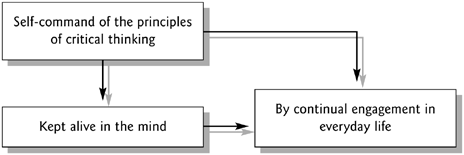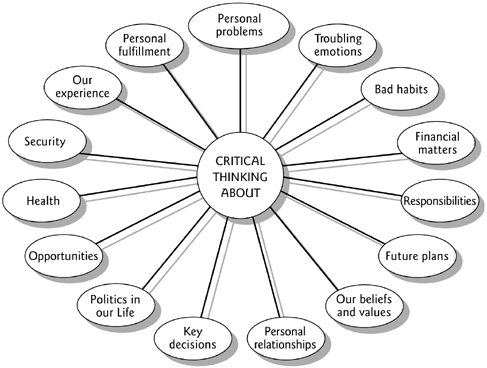Westside Toastmasters is located in Los Angeles and Santa Monica, California
Good Thinking Is as Easy as Bad Thinking (But It Requires Hard Work to Develop It)
It is important to realize that thinking itself is not difficult. Humans naturally think without having to exert much energy or engage in any real intellectual work. We can easily see thinking manifest, for example, in very young children who have few or no skills of mind. It is clear that children are thinking when they are trying to figure out their "world" and how it operates, when they are determining what they can get away with and what they can't, when they are distinguishing between people who like them and people who don't, when they are asserting what they want and what they don't want. In a similar way adults are continually thinking about their world, figuring things out, making decisions, making choices. Thus, thinking per se is natural to humans; it comes easy to us. What does not come easy is consistent high quality thinking across the dimensions of one's life. That is, it is not easy to discover our bad habits and do something about them.
To make significant gains in the quality of your thinking, you will have to engage in a kind of work that most humans find unpleasant, if not painful - intellectual work. Yet once this thinking is done and we move our thinking to a higher level of quality, it is not hard to keep our thinking at that level. Still there is a price you have to pay to step up to the next level. One doesn't become a skillful critic of thinking over night, any more than one becomes a skillful basketball player or dancer over night. To become better at thinking, you must be willing to put the work into thinking that skilled improvement always requires. We say "No pain, no gain!" when thinking of what physical conditioning requires. In this case, it would be more precise to say: "No intellectual pain, no intellectual gain!" This means you must be willing to practice special "acts" of thinking that are initially at least uncomfortable, and sometimes challenging and difficult. You have to learn to do with your mind "moves" analogous to what accomplished athletes learn to do (through practice and feedback) with their bodies. Improvement in thinking, in other words, is similar to improvement in other domains of performance, where progress is a product of sound theory, commitment, hard work, and practice. This resource will point the way to what you need to practice to become a skilled thinker, yet it cannot, of course, provide you with the internal motivation to do the required work. This must come from you (See Figure 2.1).
Figure 2.1. Critical thinkers use theories to explain how the mind works. Then they apply those theories to the way they live every day.

Let's now develop the analogy between physical and intellectual development. This analogy, we believe, goes a very long way, and provides us with just the right prototype to keep before our minds. If you play tennis, and you want to play better, there is nothing more advantageous than to look at some films of excellent players in action and then painstakingly compare how they address the ball in comparison to you. You study their performance. You note what you need to do more of, what you need to do less of, and you practice, practice, practice. You go through many cycles of practice/feedback/practice. Your practice heightens your awareness of the IN's and OUT's of the art. You develop a vocabulary for talking about your "performance." Perhaps you get a coach. And slowly, progressively, you improve. Similar points could be made for ballet, distance running, piano playing, chess, reading, writing, shopping, parenting, teaching, performing complex tasks on the job, etc.
One major problem, however, is that all the activities of skill development with which we are typically familiar are visible. We could watch a film of the skill-in-action. But imagine a film of a person sitting in a chair THINKING. It would look like the person was doing nothing. Yet, increasingly, workers are being paid precisely for the thinking they are able to do, not for their physical strength or physical activity. Therefore, though most of our thinking is invisible, it represents one of the most important things about us. Its quality will in all likelihood determine whether we will become rich or poor, powerful or weak. Yet we typically think without explicitly noticing how we are doing it. We take our thinking for granted. You might compare the way we learn how to think with the way we learned how to speak our native language. We learned, for example, the grammar of our language without explicitly knowing how to talk about that grammar, without knowing its principles, rules, and exceptions. But if I said, "Where the up cow is down?" you would recognize immediately that, grammatically speaking, that arrangement of words does not make sense. You know it violates grammatical rules without, perhaps, being able to state what rules were violated.
Of course, in addition to learning the grammar of our native language, we also learned a wide variety of "concepts," ways of organizing and interpreting our experience. Our grammatical mistakes were easily noted by anyone proficient in the grammar of the language, but our misuse of the concepts of the language often go unnoticed - especially when the misuse is common among our associates. We could say that the logic of grammar is much better known than the logic of concepts.
Grammatical mistakes are easier to recognize than "conceptual" ones. For example, one who says, "I love you," when they ought to have said, "I feel physically attracted to you," is very unlikely to say later: "I misused the concept of love, leading you to come to the conclusion that I was committed to your welfare when in fact I am not. Actually, I was just interested in having sex with you." Often people will remain married to others whose behavior toward them clearly implies that they do not love them. The inconsistency in behavior is hidden perhaps by periodic verbalizations ("I love you dearest") on birthdays or special events. Important concepts, like the concept of love, friendship, integrity, freedom, democracy, and ethics are often twisted and distorted in common life and thought. Our subconscious interest is often in getting what we want, not in describing ourselves (or the world) in a true and honest fashion.
That being said, most of our concepts are "invisible" to us, though implicit in our talk and behavior. So is much of our thinking! We would be amazed, and sometimes shocked, if we saw all of our thinking displayed for us on a large screen.
But to develop as a thinker you must begin to think of your thinking as involving an implicit set of structures, "concepts," for example, being one important set, whose use can be improved only when you begin to take the tools of thinking seriously. You develop as a thinker when you explicitly notice the thinking you are doing and when you become committed to recognizing both strengths and weaknesses in that thinking. You develop as a thinker as you build your own "large screen" on which to view your thinking.
Critical thinking, then, provides the tools of mind you need to think well through any and everything that requires thought - at work and in all parts of life (Figure 2.2 & 2.3). As your box of intellectual skills develops, you gain instruments that you can deliberately and mindfully use in order to reason better through the "thinking" tasks implicit in your short and long-range goals. There are better and worse ways to pursue whatever you are after. Good thinking enables you to maximize the one and minimize the other.
Figure 2.2. We should approach everything we do through critical thinking.

Figure 2.3. Critical thinking applies to every part of life.

Test the Idea |
It is only through applying the fundamentals of critical thinking to a wide range of human problems that one begins to appreciate their power and usefulness. Think of it this way. If we were coaching you in tennis, we would remind you again and again to keep your eye on the ball. Could you imagine telling your coach, "Why do I have to keep my eye on the ball? I already did that once." The same logic applies to the principles of skilled thinking. If you want to be proficient, you have to re-direct your eyes to the fundamentals, again and again and again.



